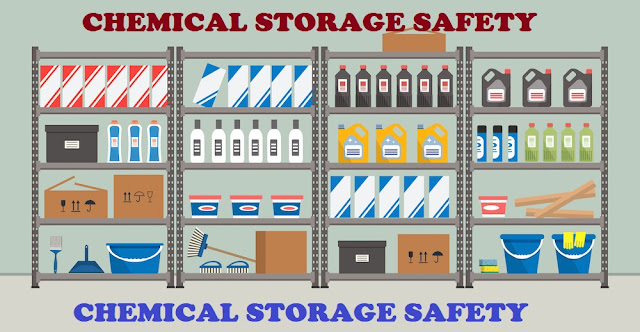Chemical
Storage Safety
ISO 9000 Quality Management System
Hazardous
chemicals should be stored under appropriate conditions, taking into account
the chemicals’ specific properties. Instructions on safe storage of chemicals
can be found in Section
7 of the SDS.
It is
also important to note if there are conditions under which hazardous reactions
may occur. For example, chemicals that can react together to form unstable or
toxic products, or produce heat, should be kept segregated. Flammable liquids
stored near a heat source could result in a fire. Section 10 of the SDS gives advice on such conditions
that you should take into account when storing your chemicals.
FREE - ISO 45001 AUDIT CHECKLIST : PART 2
Chemicals known to be carcinogenic, mutagenic or toxic to reproduction should be kept under strict control.
Chemicals with typical properties and characteristics that are relevant include:
Flammable chemicals.
Toxic or corrosive chemicals.
Chemicals that emit highly toxic fumes in the
event of a fire.
Chemicals which, in contact with water, give
off flammable gas.
Oxidising chemicals.
Explosives.
Unstable chemicals.
Compressed gases.
BOOM LIFT, DOZER (Bulldozer) - PICTORIAL CHECKLIST
When storing chemicals you should consider:
The compatibility of different chemicals. For example, oxidizing chemicals should be kept separate from flammable liquids or other flammable chemicals.
Limiting the quantities of chemicals to be stored in the chemical storage cupboard.
Ensuring there is adequate security of and access to storage areas. Potential ignition sources should be prohibited or controlled.
A safe location for storage areas. In order to minimise the effects of an incident, storage areas for chemicals should be kept separate from process areas, occupied buildings and other storage areas.
The appropriate construction, nature and integrity of chemical storage containers / chemical storage cabinet.
LEADING CAUSES OF WORK RELATED INJURIES
Safe loading, unloading and transport around the workplace.
Adequate precautions and procedures in case of spillage.
Temperature, humidity and ventilation arrangements. Ventilation
arrangements should ensure that there is no accumulation of gases, vapours or
fumes in enclosed areas.





No comments:
Post a Comment